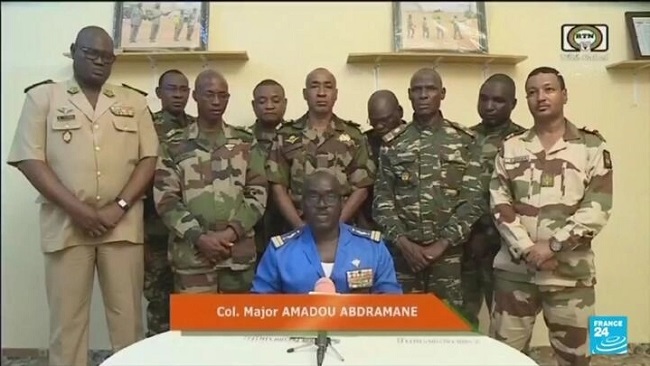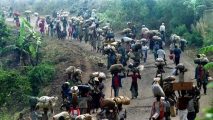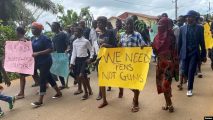14, April 2025
Burkina Faso: Where vision meets discipline 0
Burkina Faso is in the news and spotlight for all the right reasons. A once desperate nation is pointing many African countries in the right direction. The message from Ouagadougou is clear – No initiative succeeds without discipline and vision.
African countries are not poor; they have simply allowed others to design a narrative of poverty for them. For centuries, the “lords of the universe” have planted poverty in our minds and we seem to think that our poverty is divine. No, it is not. All money comes from Mother Earth and only those who understand the science of money are wealthy.
The young Burkinabe president, Ibrahim Traore, understands how wealth creation works. He has the vision and discipline to generate wealth. That is what is putting his country on the path to wealth and admiration.
Given his age, not many gave him a chance when he came to power. Many thought that without the regular allegiance to the West, Traore would not last six months in power. But the young man had his priorities properly arranged. He knew that the development of his country without Western support would be an uphill climb; he also knew that no wealth is greater than a people’s support and he has attracted his people to his side.
In this regard, he charmed his people with his simplicity and charisma. He drafted a magnificent communication strategy, knowing that his opponents and enemies were adept at manipulation and that effective communication would be their weapon of choice. His counter-offensive is working. The captain is the man of the moment around the world.
He did not just stop at talking. He knew Burkina Faso had a rich sub-soil which if properly managed could bring about instant economic transformation. He and his team immediately called for a reform of the mining sector which was in the hands of foreigners who were robbing the country blind.
Many of those companies did not pay their fair share of taxes and the former corrupt politicians prioritized self-interest above national sovereignty and economic progress. Today, the country’s gold is being refined in the country and most artisanal mining has disappeared, leaving the government with a huge revenue stream.
Reforming the mining sector has not only cut off the supply of money to terrorists, it also nets the country over USD 7 billion dollars a year. In 2024, Burkina Faso earned USD 6.48 billion dollars in gold sales alone, with Switzerland spending over USD 5 billion to obtain Burkina Faso’s gold.
But Burkina Faso does not only have gold. There is bauxite, there is iron, there is manganese and, above all, there is the right mindset. Of all the resources God has put on the surface of the earth, the human mind is the largest and the most sophisticated and Burkina Faso leaders are clearly buttressing this point.
Besides, the natural resource, governance is also a key factor. The country’s governance has improved ever since Traore and his patriotic friends took over. The country’s new leaders are transparent and determined to pull the country out of the jaws of poverty and many things are already falling in place, increasing the popular support he enjoys. Traore understands that no security system is stronger than the people’s support and he is making the most of this support by implementing projects which are pro-poor.
Captain Traore understands that much money without manufacturing could lead to inflation. He also understands that a restless youth without jobs is a huge pool of willing fighters who can easily be manipulated. Poverty hardly breeds virtue! That is why he is setting up factories which are creating jobs for young Burkinabe. He understands that a hungry man is an angry man who can easily be manipulated. He is not giving his enemies the least chance for them to manipulate his people. He is making the most of social media and the results on the ground are a faithful representation of what he says. His word is his bond!
Factories are popping up every day. Housing projects are taking shape while road construction once considered a rocket science by many Africans has been demystified. The young captain has declared that his government will be tarring 3,000 km to 5,000 km of road each year and he means it and this is music to many ears in Burkina Faso.
But manufacturing is just one sector. The young captain has adopted a holistic approach to development. His government is underscoring the importance of agriculture. Recently, it imported over 400 pieces of farming equipment which were handed over to enthusiastic farmers. The country is today one of the largest producer of wheat on the continent and the wheat is being transformed into flour.
The new leaders in Ouagadougou have packaged agriculture differently, making it more attractive to young Africans who once thought it was for the poor and illiterate. Even the country’s military is proudly involved in food production today. These efforts have put the once hungry country on the path to food security and sovereignty. Hunger is slowly being rolled out of the country and the nationals of this desert country are proud of their leaders.
No African country is financially poor. Corrupt and incompetent leadership is what is keeping many African countries in humiliating poverty which is pushing the continent’s youths to deserts, jungles and seas where they are dying in their bid to reach the Western world.
The continent’s sub-soil is rich. The continent accounts for more than 50% of the world’s mineral resources. It also accounts for 60% of the world’s arable land. Its demographic dividend is wealth other continents do not have.
Burkina Faso’s silent revolution and transformation should be a wake up call to other African leaders. Captain Traore is clearly demonstrating that wearing military fatigue is not a sign of incompetence. On the contrary, he is proving that democracy is not designed for civilians alone. Real democracy, according to him, implies loving your people and your country.
Democracy, the one run by civilians which is unnecessarily expensive, has hurt many African countries. Costly elections will not take Africa out of poverty. Africa needs leaders with a clear vision and the right discipline if this continent has to make grinding poverty a thing of the past. Captain Traore is a living example of humility, patriotism and determination. Many African leaders need to take a leaf from his book if they must kiss poverty goodbye.
By Dr Joachim Arrey

























25, April 2025
Botswana president rebukes Biya, other African leaders clinging to power 0
Botswana President Duma Boko has condemned leaders who attempt to extend their presidential terms beyond the established limits, boldly stating that such leaders are failures. His remarks came during the ground-breaking ceremony of the Bonno Target 3 000 project in Gaborone on Wednesday, where he also launched a new initiative aimed at addressing the country’s housing needs.
The Bonno Target 3 000 project will begin with the construction of 3,000 housing units across selected urban and peri-urban areas, aimed at addressing the growing demand for affordable housing in the country. However, it was Boko’s strong stance on leadership tenure that dominated headlines after the ceremony.
Boko emphasised the importance of knowing when to step aside from power, stating unequivocally that any president who seeks to hold office for more than 10 years is fundamentally failing in their role.
“I will say to you today that any president of any country who wants to be president for more than 10 years, anybody who has that ambition, is instantly a failure,” Boko remarked. “You can’t want to do this job for more than 10 years. If you take the job seriously, you can’t do it for more than 10 years.”
Boko’s comments are a sharp critique of the numerous African leaders who have clung to power for decades, often facing widespread criticism for their inability to step down despite their extended tenures. He added that any attempt to extend a presidential term was a clear sign of failure and a lack of understanding of the job’s demands.
“And anybody who sticks with the presidency for more than 10 years, that’s a sure-fire indication that he has failed. He does not understand the job,” Boko said.
His remarks come amid growing concerns about the longevity of several African leaders. Presidents such as Paul Biya of Cameroon, who has led for over 50 years, Teodoro Nguema Mbasogo of Equatorial Guinea with 45 years in power, and Uganda’s Yoweri Museveni, who has ruled for nearly 40 years, continue to dominate the political landscape in their respective countries.
Source – newsday